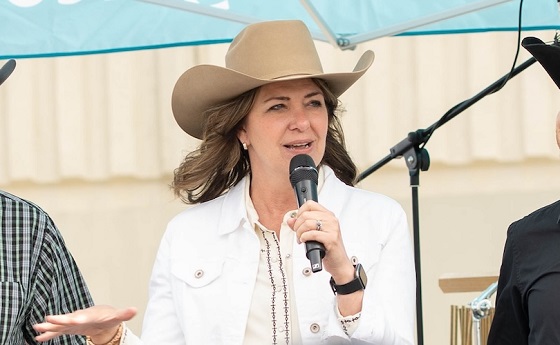Economy
UN climate elites call for money from the West, issue warning about the ‘transition’

From the Fraser Institute
By: Kenneth P. Green
” the Agreement will be implemented to reflect equity and the principle of common but differentiated responsibilities and respective capabilities, in the light of different national circumstances.” This is a long-winded way of saying the West is going to pay for all this stuff, and transfer a lot of its wealth to the UN’s designated less-developed countries “
The world’s climate policy elites have wrapped up their Conference of the Parties (COP28) in the United Arab Emirates, hopped back onto their private jets and headed home (spewing carbon emissions all the way). But not before issuing their latest manifesto on global climate change policy for our holiday reading. What do the world’s climate elites have in store for us?
First and foremost, one needs to understand that the United Nations climate agenda is about global wealth redistribution, and the usual political agenda of the UN. The very first paragraph of the manifesto makes the social justice agenda explicit: “Parties should, when taking action to address climate change, respect, promote and consider their respective obligations on human rights, the right to a clean, healthy and sustainable environment, the right to health, the rights of Indigenous Peoples, local communities, migrants, children, persons with disabilities and people in vulnerable situations and the right to development, as well as gender equality, empowerment of women and intergenerational equity.”
The second paragraph reaffirms that global wealth redistribution is at the heart of things. “Also recalling Article 2, paragraph 2, of the Paris Agreement, which provides that the Agreement will be implemented to reflect equity and the principle of common but differentiated responsibilities and respective capabilities, in the light of different national circumstances.” This is a long-winded way of saying the West is going to pay for all this stuff, and transfer a lot of its wealth to the UN’s designated less-developed countries. Specifically, this year’s manifesto repeats the call for the world’s developed countries to pony up US$100 billion per year to fund various UN initiatives such as the “green climate fund,” the “adaptation fund,” the “special climate change fund” and the “least-developed countries” fund.
On the actual nuts and bolts of climate policy, they have stayed with their arbitrary target of limiting global average temperature change to 1.5 degrees Celsius from the pre-industrial average, and their overarching agenda of achieving “net-zero” greenhouse gas emissions by 2050. And they issued various specific steps toward these goals, such as tripling renewable energy globally by 2030, accelerating the use of “unabated” coal power, accelerating the transition to zero-emission (electric) vehicles, accelerating the deployment of low- and zero-greenhouse gas emitting forms of electrical generation (including, amazingly enough, nuclear power), and so on.
And for the first time, they explicitly called for, via the UN secretary general, the “transition away from fossil fuels—after many years in which the discussion of this issue was blocked.” And issued a warning. “To those who opposed a clear reference to a phase out of fossil fuels in the COP28 text, I want to say that a fossil fuel phase out is inevitable whether they like it or not. Let’s hope it doesn’t come too late,” adding that the “era of fossil fuels must end—and it must end with justice and equity.”
The UN’s latest climate manifesto is pretty much business as usual. Same arbitrary target of limiting warming to 1.5 °C, net-zero emissions by 2050, same boosting of a “renewables” transition, transport electrification, and so on. The new explicit call for moving away from fossil fuels will likely be the biggest theme in coming years, with increasing vilification and penalization of oil and gas producers (in the West) who have now been put on the species to become rendered extinct list. This will be happy holiday music to the ears of Prime Minister Trudeau and Environment Minister Guilbeault, but not likely a popular tune in the Prairies.
Business
Canada Hits the Brakes on Population

The population drops for the first time in years, exposing an economy built on temporary residents, tuition cash, and government debt rather than real productivity
Canadians have been told for years that population decline was unthinkable, that it was an economic death spiral, that only mass immigration could save us. That was the line. Now the numbers are in, and suddenly the people who said that are very quiet.
Statistics Canada reports that between July 1 and October 1, 2025, Canada’s population fell by 76,068 people, a decline of 0.2 percent, bringing the total population to 41,575,585. This is not a rounding error. It is not a model projection. It is an official quarterly population loss, outside the COVID period, confirmed by the federal government’s own data
The reason matters. This did not happen because Canadians suddenly stopped having children or because of a natural disaster. It happened because the number of non‑permanent residents dropped by 176,479 people in a single quarter, the largest quarterly decline since comparable records began in 1971. Permit expirations outpaced new permits by more than two to one. Outflows totaled 339,505, while inflows were just 163,026
That is the so‑called growth engine shutting down.
Permanent immigration continued at roughly the same pace as before. Canada admitted 102,867 permanent immigrants in the quarter, consistent with recent levels. Births minus deaths added another 17,600 people. None of that was enough to offset the collapse in temporary residency. Net international migration overall was negative, at minus 93,668
And here’s the part you’re not supposed to say out loud. For the Liberal‑NDP government, this is bad news. Their entire economic story has rested on population‑driven GDP growth, not productivity. Add more people, claim the economy is growing, borrow more money, and run the national credit card a little harder. When population growth reverses, that illusion collapses. GDP per capita does not magically improve. Housing shortages do not disappear. The math just stops working.
The regional numbers make that clear. Ontario’s population fell by 0.4 percent in the quarter. British Columbia fell by 0.3 percent. Every province and territory lost population except Alberta and Nunavut, and even Alberta’s growth was just 0.2 percent, its weakest since the border‑closure period of 2021
Now watch who starts complaining first. Universities are already bracing for it. Study permit holders alone fell by 73,682 people in three months, with Ontario losing 47,511 and British Columbia losing 14,291. These are the provinces with the largest university systems and the highest dependence on international tuition revenue
You’re going to hear administrators and activists say this is a crisis. What they mean is that fewer students are paying international tuition to subsidize bloated campuses and programs that produce no measurable economic value. When the pool of non‑permanent residents shrinks, departments that exist purely because enrollment was artificially inflated start to disappear. That’s not mysterious. That’s arithmetic.
For years, Canadians were told that any slowdown in population growth was dangerous. The truth is more uncomfortable. What’s dangerous is building a national economic model on temporary residents, borrowed money, and headline GDP numbers while productivity stagnates. The latest StatsCan release doesn’t just show a population decline. It shows how fragile the story really was, and how quickly it unravels when the numbers stop being padded.
Subscribe to The Opposition with Dan Knight
Business
White House declares inflation era OVER after shock report

The White House on Thursday declared a decisive turn in the inflation fight, pointing to new data showing core inflation has fallen to its lowest level in nearly five years — a milestone the administration says validates President Donald Trump’s economic reset after inheriting what it calls a historic cost-of-living crisis from the Biden era. In a statement accompanying the report, White House Press Secretary Karoline Leavitt said inflation “came in far lower than market expectations,” drawing a sharp contrast with the 9 percent peak under President Joe Biden and arguing the numbers reflect sustained relief for American households. “Core inflation is at a new multi-year low, as prices for groceries, medicine, gas, airfare, car rentals, and hotels keep falling,” Leavitt said, adding that lower prices and rising paychecks are expected to continue into the new year.
According to the White House, core inflation — widely viewed by economists as the most reliable gauge because it strips out volatile food and energy costs — is now down roughly 70 percent from its Biden-era high. Officials noted that if inflation continues at the pace of the last two months, it would be running at an annualized rate of about 1.2 percent, well below the Federal Reserve’s 2 percent target. The report also highlighted broad-based price moderation across consumer staples and services, with declines in groceries, dairy, fruits and vegetables, prescription drugs, clothing, airfares, natural gas, car and truck rentals, and hotel prices. Average gas prices have fallen to multi-year lows, while rent inflation has dropped to its lowest level since October 2021, a shift the administration attributes in part to tougher enforcement against illegal immigration and reduced pressure on housing demand.
Wages, the White House says, are rising alongside easing prices. Private-sector workers are on track to see real wages increase by about $1,300 in President Trump’s first full year back in office, clawing back purchasing power lost during the inflation surge of the previous administration. Gains are strongest among blue-collar workers, with annualized real earnings up roughly $1,800 for construction workers and $1,600 for manufacturing employees. Administration officials also took aim at critics who warned Trump’s tariff policies would reignite inflation, arguing the data shows no demonstrable inflationary impact despite repeated predictions from Wall Street and academic economists.
NEC Director Kevin Hassett on the latest inflation report: "It was just an absolute blockbuster report… We looked at 61 forecasts, and this number came in better than every single one of them." 🔥 pic.twitter.com/rBJpkmjuNa
— Rapid Response 47 (@RapidResponse47) December 18, 2025
Even commentators across the media spectrum acknowledged the strength of the report. CNBC’s Steve Liesman called it “a very good number,” while CNN’s Matt Egan said it was “another step in the right direction.” Harvard economist Ken Rogoff described the reading as “a better number than anyone was expecting,” adding, “There’s no other way to spin it.” Bloomberg’s Chris Anstey noted the figure came in two-tenths below the lowest estimate in a survey of 62 economists, calling it “remarkable,” while The Washington Post’s Andrew Ackerman wrote that inflation “cooled unexpectedly,” easing pressure on household budgets.
For the White House, the message was blunt: the inflation era is over. Officials framed Thursday’s report as proof that Trump has followed through on his promise to defeat the cost-of-living crisis he inherited, laying what they called the groundwork for a strong year ahead. As the president told the nation this week, the administration insists the progress is real — and that, in his words, the best is yet to come.
-

 International2 days ago
International2 days agoBondi Beach Shows Why Self-Defense Is a Vital Right
-

 Automotive1 day ago
Automotive1 day agoFord’s EV Fiasco Fallout Hits Hard
-

 Censorship Industrial Complex2 days ago
Censorship Industrial Complex2 days agoHow Wikipedia Got Captured: Leftist Editors & Foreign Influence On Internet’s Biggest Source of Info
-

 Crime2 days ago
Crime2 days agoBondi Beach Survivor Says Cops Prevented Her From Fighting Back Against Terrorists
-

 Frontier Centre for Public Policy1 day ago
Frontier Centre for Public Policy1 day agoCanada Lets Child-Porn Offenders Off Easy While Targeting Bible Believers
-

 Crime2 days ago
Crime2 days agoThe Uncomfortable Demographics of Islamist Bloodshed—and Why “Islamophobia” Deflection Increases the Threat
-

 Alberta2 days ago
Alberta2 days agoDanielle Smith slams Skate Canada for stopping events in Alberta over ban on men in women’s sports
-

 International1 day ago
International1 day agoHouse Rejects Bipartisan Attempt To Block Trump From Using Military Force Against Venezuela








